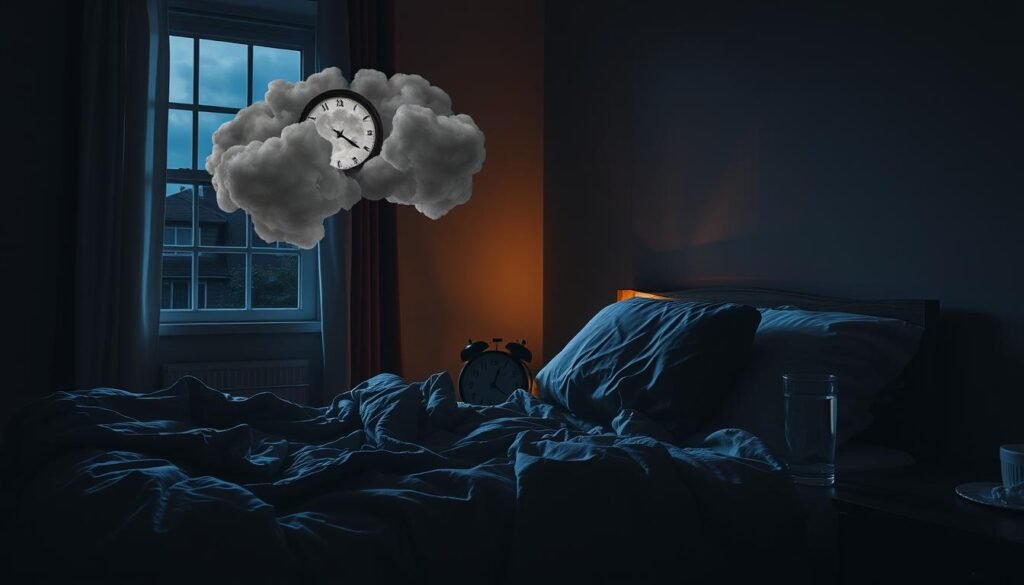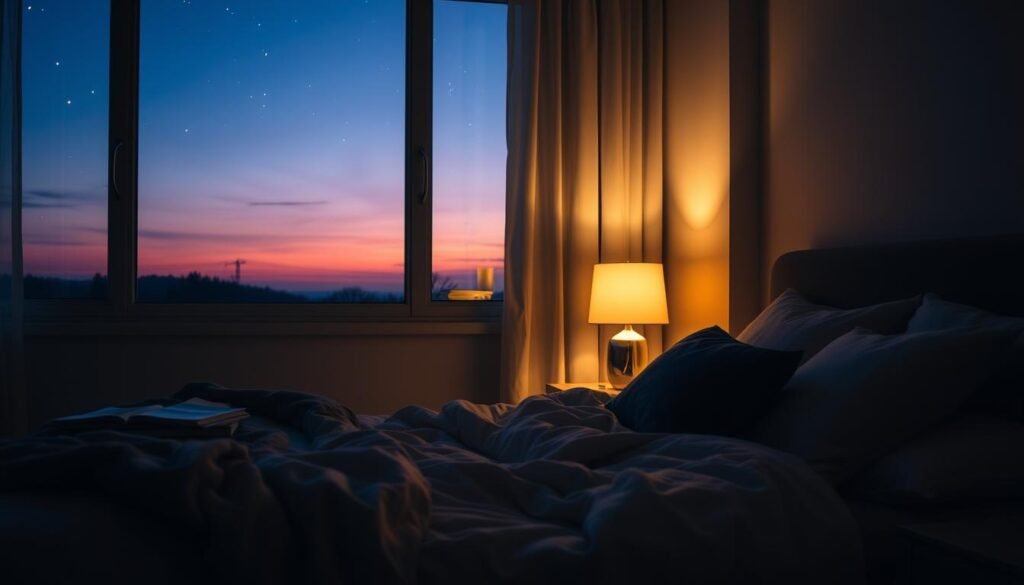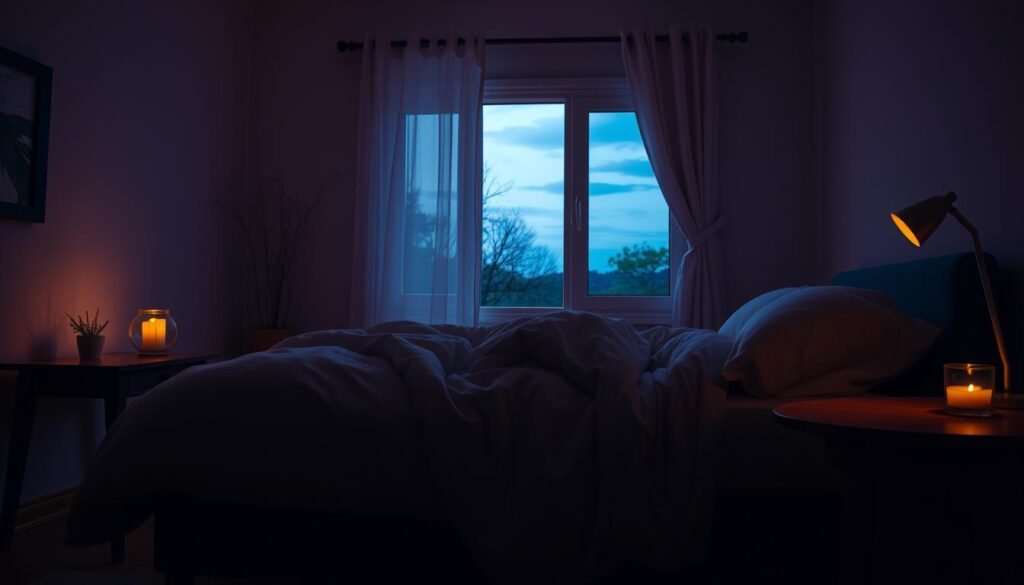Why does anxiety tend to show up at night? Many of us can’t find the sleep we need because of it. This problem is huge, with over 40 million adults in the U.S. facing anxiety disorders every year. But there are ways to deal with nighttime anxiety.
By tackling sleep anxiety, you can relax better and improve your sleep. Let’s look at how to calm those overwhelming night thoughts. Doing so can make your nights more peaceful.
Key Takeaways
- Nighttime anxiety is a prevalent issue impacting millions, affecting both adults and children.
- Establishing a consistent bedtime routine can significantly improve sleep quality.
- Mindfulness practices and breathing exercises are effective methods for reducing anxiety.
- Creating a sleep-friendly environment promotes better rest and relaxation.
- Consulting with a mental health professional can provide valuable insights into managing anxiety disorders.
- Nutritional choices, such as tart cherries or Brazil nuts, can enhance sleep quality.
Understanding Nighttime Anxiety
Nighttime anxiety combines mental and physical factors. The brain, especially the amygdala, sees danger more sharply at night. Knowing how these parts work together can help manage nighttime anxiety and improve sleep.
The Science Behind Nighttime Anxiety
Nighttime anxiety has complex physical responses. Stress usually leads to more anxiety at night. People with anxiety disorders can feel stronger effects. Genes play a role too; if a family member has anxiety, you might be more likely to have it as well.
At night, without distractions, worries can overwhelm us. This may cause difficulty focusing and restlessness. Deep breathing exercises and a bedtime routine can help ease these symptoms.
Common Triggers of Anxiety at Night
Several things can trigger nighttime anxiety. Common triggers include:
- Daytime stress
- Worrying about tomorrow’s tasks
- Thinking too much in bed
When it’s quiet, these worries grow, making insomnia and anxiety feed off each other. This can cause fast heartbeat, sweating, or a choking feeling during night panic attacks.
To fight anxiety, addressing root causes is key. Cognitive Behavioral Therapy (CBT) and muscle relaxation are good tactics. A cool, quiet sleep space, between 60-67°F (15.6-19.4°C), also helps deal with anxiety at night.
| Trigger | Potential Impact |
|---|---|
| Daily Stressors | Raises anxiety, causes restless thoughts and trouble sleeping. |
| Unresolved Worries | Brings back concerns in quiet times, increasing anxiety. |
| Insomnia | Makes anxiety worse, in a continuous loop of unease. |
| Lack of Sleep | Makes it harder to deal with stress and worry, adding to anxiety. |
Why Do We Experience Anxiety at Night?
At night, anxiety can come from many factors, leading to unease. A key reason is racing thoughts as we try to relax. These thoughts often focus on unfinished tasks, health worries, or stress from work and family. So, night becomes a time of stress instead of rest.
Racing Thoughts and Reflection
During the night, reflecting on the day or stressing about tomorrow is common. This leads to racing thoughts, making peace hard to find. The mind gets stuck on what was missed or what’s urgent, keeping the stress cycle going. This not only hurts our emotional state but can cause sleep problems, worsening anxiety at night.
The Role of Cortisol and Stress Hormones
At night, cortisol and stress hormones have a big impact on anxiety. Under stress, our bodies release cortisol, which should calm down at night. But, ongoing stress messes up hormone levels, making us more prone to nighttime anxiety. This cycle increases cortisol at night, affecting sleep and making us tired during the day.
It’s important to know the signs and get help, maybe through therapy or changing your lifestyle. Understanding how anxiety, racing thoughts, and cortisol affect each other is key to managing nighttime anxiety. For tips on handling it, check out this detailed guide.
Recognizing the Symptoms of Nighttime Anxiety
It’s crucial to know the signs of nighttime anxiety. This will help manage it better. People may feel both physical and mental effects that prevent them from relaxing and sleeping well. Recognizing these symptoms means you can take steps to deal with nighttime anxiety and feel better.
Physical Symptoms
Nighttime anxiety can cause uncomfortable physical symptoms. Some people may feel:
- Increased heart rate
- Chest pains
- Sweating
- Shortness of breath
- Gastrointestinal disturbances
These symptoms can make you feel very unsettled. It becomes hard to calm down and sleep well.
Mental Symptoms
Nighttime anxiety also affects your mental health. You might experience symptoms like:
- Persistent worrying about daily events
- Difficulty concentrating
- Feelings of nervousness and restlessness
- Inability to unwind or relax
These mental signs can get worse when it’s time to sleep, causing insomnia. Stress from work, relationships, and money issues often makes these symptoms stronger. For tips on handling anxiety, check out coping techniques to help improve mental health.

Building a Resilient Evening Routine
A calming evening routine is key for less anxiety and better sleep. Moving from a busy day to a calm night tells the brain it’s time to slow down. Having a set routine helps you get ready for bed better.
Transitioning from Day to Night
Starting a nightly routine 60 minutes before bed helps your mind and body relax. Making a to-do list for tomorrow or writing in a journal can ease daily stress. Mindfulness practices are proven to lower anxiety levels significantly.
After six weeks of mindfulness meditation training, less insomnia was reported. A warm shower or bath before bed can also make falling asleep easier by improving sleep quality.
Incorporating Relaxation Practices
Adding different relaxation methods to your night routine can help calm your anxiety. Listening to music at about 60 beats per minute can make a relaxing atmosphere. Plus, reading fiction before sleeping decreases stress and enhances sleep quality.
Meditation and box breathing before bed can quiet the mind. This makes falling asleep easier. A relaxing evening is crucial, more so in a world where anxiety affects millions.

Effective Strategies for Coping with Anxiety at Night
Managing nighttime anxiety requires proactive strategies. Mindfulness techniques help ground you when stressed. Using meditation and focused breathing can shift attention away from worrying thoughts.
Visualization is another key method. Imagine peaceful places or happy moments to encourage relaxation. This can lead to a better night’s sleep.
Mindfulness and Meditation Techniques
Mindfulness practices help you stay in the present. This can stop your thoughts from racing. Meditation offers calm through guided or personal sessions.
The 4-7-8 breathing method is especially relaxing. It involves controlled breathing. Making mindfulness and meditation part of your nightly routine can reduce anxiety.
Visualization Techniques for Calming the Mind
Visualization is effective for reducing nighttime anxiety. Picture yourself in calming places like a quiet beach or a peaceful forest. This helps your body unwind and sleep better.
Regularly practicing visualization can calm your mind and build positive thinking. It creates a soothing mental space for those with night anxiety.

Creating a Sleep-Friendly Environment
A good night’s sleep begins with a sleep-friendly environment. This means setting up your bedroom to help you relax. It’s important because it helps lessen anxiety and lets you sleep well. Let’s look at how to make the perfect sleep setting.
Optimal Bedroom Setup for Relaxation
The right temperature, light, and noise levels are key for good sleep. Keep your room between 60 to 67 degrees Fahrenheit. Finding a comfy temperature setting is crucial. Also, avoid blue light from screens before bed because it can keep you awake.
Keeping your room quiet is also vital. You might try white noise machines or soundproofing to cut down on noise. Doing this can improve your sleep and make you healthier overall.
A comfy mattress and pillow are part of good sleep hygiene too. The wrong pillow might cause neck pain, hurting your sleep quality. A mattress that fits your body can help you sleep better and ease back pain.
Adding calming scents, like lavender oil, improves sleep too. Soothing music can also help calm your mind. These touches make your bedroom a better place to sleep.
Don’t forget to clean regularly. Washing your sheets every two weeks keeps dust away and helps you sleep better. A clean, tidy room makes for a more relaxing sleep environment.
Pre-Sleep Activities to Reduce Anxiety at Night
Calming activities before bed decrease anxiety as the night approaches. Setting aside time without tech helps one relax more deeply. It allows the mind to let go of stress from the day. Opting for no tech means less distraction, leading to peaceful rest.
Tech-Free Time Before Bed
Spending 30 to 60 minutes without technology before sleep can really enhance sleep. Avoiding screens helps relax the mind. Not being exposed to blue light boosts melatonin, aiding sleep. Try reading a book or journaling for a restful evening.
Engaging in Calming Activities
Incorporating calming exercises into your night routine helps manage anxiety. Gentle yoga, deep breathing, or meditation can soothe you into sleeping well. Studies show yoga and meditation lower stress levels and relax the heart rate.
- Gentle stretching to release muscle tension
- Meditation for mental clarity and peace
- Listening to soothing music to foster relaxation
- Reading for pleasure to stimulate the mind positively
By spending time on these activities before bed, individuals can reduce anxiety. This leads to better sleep quality.
Nutrition and Nighttime Anxiety Management
The link between what we eat and how we sleep is key for handling nighttime worry. Studies find that some foods can change sleep quality, affecting anxiety. For example, eating salmon is good because it has lots of omega-3 fats, reducing stress-related inflammation. Avocados also help by giving magnesium and fiber, managing stress hormone levels and mood.
The Impact of Food on Sleep Quality
Choosing the right snacks at night can make sleep better and lessen worry signs. Probiotic-rich foods like yogurt keep your gut healthy, important for a calm mind. Veggies with a lot of fiber, such as broccoli and leafy greens, feed good gut bacteria to help calm anxiety. However, avoid drinks with alcohol or caffeine before sleeping. They can make anxiety worse and mess up sleep.
For more tips on eating to ease anxiety and sleep well, check out these thoughts from TrueSport.
Foods and Drinks to Promote Relaxation
Eating calming foods in the evening can bring peace before bed. It’s best to eat light meals with lean protein and healthy fats, steering clear of heavy and spicy dishes to avoid indigestion. Avoid high-fat and high-protein meals right before sleep—they can break your sleep and make you feel tired. Try a small snack like a yogurt parfait with berries to bring calmness and improve sleep health.